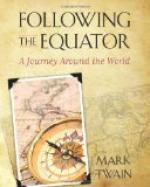The principle which underlies and orders everything connected with a Parsee funeral is Purity. By the tenets of the Zoroastrian religion, the elements, Earth, Fire, and Water, are sacred, and must not be contaminated by contact with a dead body. Hence corpses must not be burned, neither must they be buried. None may touch the dead or enter the Towers where they repose except certain men who are officially appointed for that purpose. They receive high pay, but theirs is a dismal life, for they must live apart from their species, because their commerce with the dead defiles them, and any who should associate with them would share their defilement. When they come out of the Tower the clothes they are wearing are exchanged for others, in a building within the grounds, and the ones which they have taken off are left behind, for they are contaminated, and must never be used again or suffered to go outside the grounds. These bearers come to every funeral in new garments. So far as is known, no human being, other than an official corpse-bearer—save one—has ever entered a Tower of Silence after its consecration. Just a hundred years ago a European rushed in behind the bearers and fed his brutal curiosity with a glimpse of the forbidden mysteries of the place. This shabby savage’s name is not given; his quality is also concealed. These two details, taken in connection with the fact that for his extraordinary offense the only punishment he got from the East India Company’s Government was a solemn official “reprimand”—suggest the suspicion that he was a European of consequence. The same public document which contained the reprimand gave warning that future offenders of his sort, if in the Company’s service, would be dismissed; and if merchants, suffer revocation of license and exile to England.




